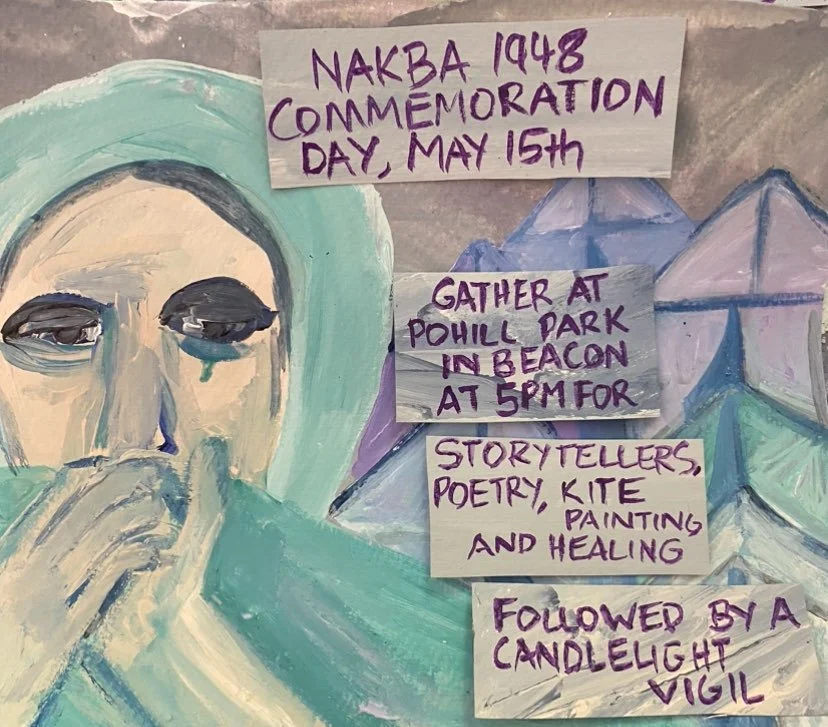Police Attack Pro-Palestine Gaza Solidarity Encampment At SUNY New Paltz
/by Arvind Dilawar
Encampment was entirely peaceful before violent eviction by police
On the evening of May 2, more than 150 police officers from the New York State Police, State University Police, Ulster County Sheriff’s Office and New Paltz Police Department arrested 132 students and community members on the campus of the State University of New York at New Paltz, as reported by Times Union.
Like students, faculty, staff and community members across the United States, the encampment at SUNY New Paltz sought university divestment from Israel due to its ongoing genocide in Gaza and occupation of Palestine more broadly. And like encampments across the United States, the one at SUNY New Paltz was met with overwhelming police violence.
In a message to the SUNY New Paltz community, University President Darrell P. Wheeler acknowledged calling police onto campus to attack the encampment of students and community members, who had gathered at Parker Quad, a lawn between university buildings. Participants had established the encampment the previous day to express their solidarity with Palestinians in Gaza, at least 34,904 of whom — including 14,500 children — have been killed in the ongoing Israeli genocide, according to Al Jazeera at the time of this writing. In response to the genocide and Israel’s occupation of the West Bank, which is internationally recognized as Palestinian territory, the encampment demanded that the university cut ties with companies that do business with the Israeli government, such as Siemens, which provides Israeli infrastructure in the West Bank and has a number of partnerships with SUNY.
Nowhere in Wheeler’s aforementioned note did he accuse the encampment of being violent — which, according to both participating students and community members, it was not.
“The encampment was one of the most serene and peaceful communities I’ve ever had the pleasure of being a part of,” says Theo Ertz, a student at SUNY New Paltz. “From the beginning, the solidarity encampment in Parker Quad centered education and community bonding. We ate meals together, sang together, read books, attended multiple teach-ins and made art daily.”
“The encampment prior to police escalation was more akin to a party than anything,” echoes Kyle Krimsky, who joined the encampment after students invited community members to do so. “Students and other demonstrators chanted, danced around, even exchanged books at a makeshift library. Professors and community members mingled throughout the day. It was peaceful, upbeat and uplifting.”
Despite the encampment’s peacefulness, riot-gear-clad police met it with extraordinary violence, including chokeholds and batons, while being backed up by K-9 units, drones and even a police helicopter. As part of a medical team ferrying the injured to an EMT, Ertz saw firsthand how police responded to the encampment.
“Students and community members who were protesting were sitting down with locked arms and legs in an attempt to protect each other and the encampment,” they recall. “I watched helplessly as my friends were torn apart, dragged, beaten and absolutely brutalized by police one-by-one. During the second phase of the raid sweep, my hands were already in the air, but I was still dragged and thrown to the ground, with legs and hands held tightly behind my back while a knee held me down.”
“Some of my friends were kicked, beaten with batons and concussed as a result of the excessive force,” they continue. “A bystander was even bitten by a K-9. An 82-year-old woman was dragged across the ground and later had to be hospitalized after losing consciousness. While we were waiting in line for processing, I saw multiple police officers sexually assault students.”
After being struck in the head by a police officer, Krimsky was also arrested and eventually charged with trespassing — as were most of the arrestees, according to Times Union. Worse than the trespassing charge, which is a violation most frequently punishable with a fine, was the loss of personal property.
“My cell phone and wallet were dislodged from my pocket during my arrest,” says Krimsky. “I had a duffel bag with a change of clothes and power bank, along with a tent. Everything I lost, along with all of the rest of the lost belongings of the demonstrators — bags, IDs, cell phones, keys and medications — were all thrown out by SUNY New Paltz staff.”
“I lost my medical bag with perfectly good supplies,” says Ertz as well. “But others lost phones, laptops, medicine and more.”
Despite the losses and the violence, both Ertz and Krimsky are adamant that their solidarity with Palestinians facing Israeli genocide and occupation has not wavered one bit.
“My support for Palestinian liberation is as ardent as it was before my arrest,” says Krimsky. “The violence the state subjected us to that night isn't a drop in the ocean of suffering that are the lives of Palestinians under Israeli occupation. None of us are going to stop until our leaders step up to protect human rights.”
“I think these harsh tactics were used purposefully to scare us into submission, but it has done quite the opposite for me,” says Ertz. “Despite the immense emotional and physical traumas, I am reminded constantly that we experienced a small drop of what the Palestinian people have been going through for seven months. My solidarity with Palestine has not faltered for a second. It has become so much stronger.”
































